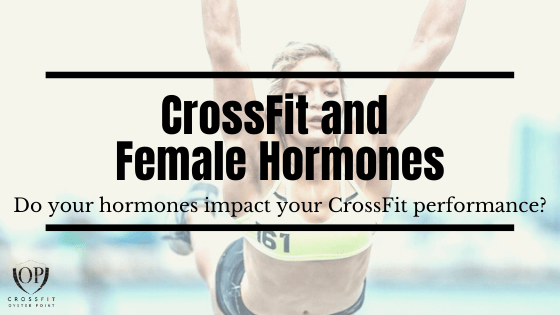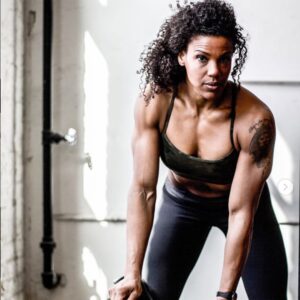Do your hormones impact your CrossFit performance?
As a Female CrossFit Athlete, this is probably something you’ve asked yourself, brought on by a terrible training session sometime around the start of your cycle.
A quick review: during each month, your hormones fluctuate throughout a cycle and are categorized into 4 Phases (we’ll review them as we go). But how do these different phases impact our workout performance?
The hormones that fluctuate throughout our cycle include Estrogen, Progesterone, Testosterone, Luteinizing Hormone (LH) and Follicle-Stimulating Hormone (FSH). Throughout the cycle, some hormones peak and others nosedive and each has an impact on our physiology.
While everyone is different and may experience varying symptoms during each phase, I’m going to break down what’s happening at the hormonal level and how that is likely to impact performance.
Menstrual Phase: When your period begins (days 1-5ish)
Hormones: Estrogen and Progesterone are at their low “base” level.

- Pain tolerance is high
- Recovery time is quick (compared to other phases)
- Fat breakdown and muscle building is optimized
- Strength Training tends to feel great during this phase
Follicular Phase: When your period ends to just before ovulation (days 6-14ish)
Hormones: Estrogen is increasing, Progesterone is at normal levels
Physiology:
- Estrogen helps your muscles absorb glucose better, leading to better energy output
- Strength Training and High Intensity Intervals feel good during this phase, it’s when you feel like you can really go hard.
Ovulation Phase: When ovulation occurs until hormones begin to drop (days 15-16ish)
Hormones: Estrogen is at its highest, Progesterone is rising and Testosterone increases too.
Physiology:
- Body Temperature is higher than usual…this means your cardiac output will be less and your breathing rate increased from normal (it’s not at a level you will necessarily notice outright, but these small changes can still impact your workouts!)
- The increase in temperature also means your metabolic rate will increase. That increase in hunger around this time is because you are burning more calories and needing more food to match your usual intake!
- The increase in Testosterone means you have the highest amount of power output in this phase. Going to a PR could be successful!
 Luteal Phase: When hormones drop following Ovulation until your period begins (days 16-28ish)
Luteal Phase: When hormones drop following Ovulation until your period begins (days 16-28ish)
Hormones: Everything takes a nosedive, then slowly rises.
Physiology:
- Your body will retain more water here, causing those bloated feelings.
- You’ll experience PMS symptoms including mood swings, poor recovery and a decrease in energy.
- You’ll experience higher cardiac strain which will decrease overall endurance.
- Focusing more on skill work here, instead of heavy strength training or high intensity workouts, will feel better and be more productive.
Now, what to do with this information…
Unfortunately, there isn’t a ton of research on female athletes. While researching for this article, I found a lot of misinformation and contradicting advice about each phase. I gathered what I could and related my own experiences to these recommendations. Ultimately, we can aim to be educated as much as possible on the topic while also paying close attention to our own bodies and becoming in tune with the changes we experience throughout the month.
You don’t necessarily need to completely reframe your training protocol to match each phase. However, becoming aware of what is happening inside your body that may affect your training can be really helpful for your goals and your mindset during each training session.

I highly recommend you track your menstrual cycle in an app to keep track of these phases. Some apps I recommend are Clue, Eve and FitrWoman (I utilized FitrWoman when writing this article, it shows you what is happening each month, how your training may feel, and nutrition recommendations to feel best during each phase).
Also…
A consistent menstrual cycle with minor symptoms is a sign of an overall healthy body. If you aren’t having a period at all or experience really severe PMS you should definitely visit with your doctor and consider what lifestyle habits you could improve (in majority of cases, female athletes need to eat more to support a healthy menstrual cycle which also results in improved immune system, digestive system and so much more, then leading to improved performance and body composition). Other lifestyle habits that could impact your cycle are stress, sleep and your activity output.





 Luteal Phase: When hormones drop following Ovulation until your period begins (days 16-28ish)
Luteal Phase: When hormones drop following Ovulation until your period begins (days 16-28ish)